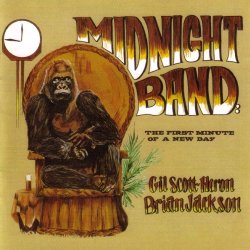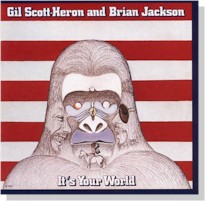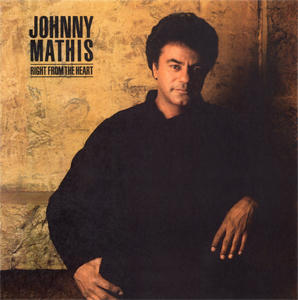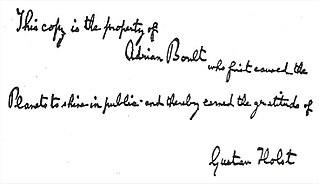
Triumph is the fourteenth studio album by the Jacksons, released in 1980 on Epic Records.

Tonto's Expanding Head Band was a British-American electronic music duo consisting of Malcolm Cecil and Robert Margouleff. Despite releasing only two albums in the early 1970s, the duo were influential because of their session and production work for other musicians, extensive commercial advertising work and the unique warmth and personality of their work.

Kamaal the Abstract is the third studio album by American hip hop artist Q-Tip, released September 15, 2009, on Battery Records. Recorded in 2001, the album is a departure from his solo debut album Amplified (1999). Kamaal the Abstract is an eclectic album that features Q-Tip rapping, singing, and exploring his jazz influences. The album contains introspective and life-related lyrical themes.

Malcolm Cecil is a British jazz bassist and Grammy Award-winning record producer.

From South Africa to South Carolina is a studio album by American vocalist Gil Scott-Heron and keyboardist Brian Jackson. It was released in November 1975 by Arista Records. Scott-Heron performed "Johannesburg" and "A Lovely Day" on the sketch comedy show Saturday Night Live in December 1975.

Pieces of a Man is the first studio album by American vocalist Gil Scott-Heron. It was recorded in April 1971 at RCA Studios in New York City and released later that year by Flying Dutchman Records. The album followed Heron's debut live album Small Talk at 125th and Lenox (1970) and departed from that album's spoken word performance, instead featuring compositions in a more conventional popular song structure.

Winter in America is a studio album by American vocalist Gil Scott-Heron and keyboardist Brian Jackson. It was recorded in September to October 1973 at D&B Sound Studio in Silver Spring, Maryland and released in May 1974 by Strata-East Records. Scott-Heron and Jackson produced the album in a stripped-down fashion, relying on traditional African and R&B sounds, while Jackson's piano-based arrangements were rooted in jazz and the blues. The subject matter on Winter in America deals with the African-American community and inner city in the 1970s.

The First Minute of a New Day is an album by American jazz vocalist Gil Scott-Heron and keyboardist Brian Jackson, released in January 1975 on Arista Records. Recording sessions for the album took place in the summer of 1974 at D&B Sound in Silver Spring, Maryland. It was the follow-up to Scott-Heron's and Jackson's critically acclaimed collaboration effort Winter in America. The First Minute of a New Day was the first album to feature "Winter in America", the title track of Scott-Heron's previous album which was not featured on its original LP release. The album was reissued on compact disc by Scott-Heron's label Rumal-Gia Records in 1998.

Jermaine Jackson is the tenth studio album by United States singer-songwriter Jermaine Jackson, released in 1984. It was his debut album with Arista after leaving Motown. The album features Whitney Houston and his brothers Michael, Tito and Randy. Overall, it stands as one of Jermaine Jackson's most commercially successful albums, selling over 900,000 copies in the US to date and being certified Gold by the Recording Industry Association of America (RIAA).

"The Bottle" is a song by American soul artist Gil Scott-Heron and musician Brian Jackson, released in 1974 on Strata-East Records in the United States. It was later reissued during the mid-1980s on Champagne Records in the United Kingdom. "The Bottle" was written by Scott-Heron and produced by audio engineer Jose Williams, Jackson, and Scott-Heron. The song serves is a social commentary on alcohol abuse, and it features a Caribbean beat and notable flute solo by Jackson, with Scott-Heron playing keyboards.

It's Your World is a double album by soul artist Gil Scott-Heron and musician Brian Jackson, released in November 1976 on Arista Records. Recording sessions for the album took place in studio and live in July 1976 at St. Paul's Mall in Boston, Massachusetts, Electric Lady Studios in New York City, and American Star Studios in Merrifield, Virginia. Scott-Heron and Jackson recorded the album with the former's backing ensemble, The Midnight Band. It's Your World was originally released on vinyl and was later re-released in 2000 on compact disc by Scott-Heron's Rumal-Gia label.

The Revolution Will Not Be Televised is a compilation album by American vocalist Gil Scott-Heron, released in 1974 by Flying Dutchman Records. The album takes its name from Scott-Heron's 1971 song of the same name. It features recordings previously featured on Scott-Heron's first three albums for the Flying Dutchman label, Small Talk at 125th and Lenox (1970), Pieces of a Man (1971), and Free Will (1972), which were produced by jazz producer Bob Thiele. The album's recordings feature musical elements of funk, jazz, and proto-rap.

A New Black Poet - Small Talk at 125th and Lenox, also known simply as Small Talk at 125th and Lenox, is the debut album of recording artist Gil Scott-Heron, released in 1970 on Flying Dutchman Records. Recording sessions for the album were originally said to have taken place live at a New York nightclub located on the corner of 125th Street and Lenox Avenue, but liner notes included in the 2012 box set The Revolution Begins: The Flying Dutchman Masters, Scott-Heron himself insists that a small audience was brought to 'the studio' and seated on 'folding chairs'. By the time of the recordings, Scott-Heron had published a volume of poetry and his first novel, The Vulture. Well received by music critics who found Scott-Heron's material imaginative, Small Talk at 125th and Lenox has been described as "a volcanic upheaval of intellectualism and social critique" by Allmusic editor John Bush.

The Mind of Gil Scott-Heron is a 1978 album by spoken word and rap pioneer Gil Scott-Heron. Like many of Scott-Heron's albums, the album's content primarily addresses political and social issues; however, The Mind of Gil Scott-Heron relies far more on his spoken word delivery than his other albums. Whereas much of the artist's earlier albums contained backup jazz-funk music from Brian Jackson, many of these tracks, which address contemporary issues such as Watergate, the pardon of Richard Nixon and the Attica Prison riot, are either live recordings or studio-recorded songs with little more than sparse drum backing or occasional instrumentation. Many of the tracks featured were included on previous Gil Scott-Heron albums.

Bridges is an album by Gil Scott-Heron & Brian Jackson, released in the fall of 1977 on Arista Records.

Spirits is the 1994 album by Gil Scott-Heron. The title track is an interpretation of the John Coltrane piece, and "The Other Side" is a live version of Scott-Heron's 1971 track "Home is Where the Hatred Is" with a new arrangement and many new verses that expand the original to nearly twenty minutes. It was later sampled for "Home" on the 2011 Jamie XX collaboration album, We're New Here.

Right from the Heart is an album by American pop singer Johnny Mathis that was released on March 18, 1985, by Columbia Records and was his first album without songs that were previously recorded by other artists. The title track is one of the album's four ballads that, along with four of the remaining six up-tempo tracks, delve into the subject of relationships, but it's the synth-driven "Step by Step" and the anthemic "Hold On" on which Mathis takes a break from the usual focus on love songs. The former offers the hope that can be found in change that comes gradually until "I can see the way free from yesterday to a new beginning." The latter stresses the importance of being oneself: "Life is a party. Why don't you come the way you are?"

1980 is a studio album by American vocalist Gil Scott-Heron and keyboardist Brian Jackson. It was recorded from August to October 1979 and released in February 1980 by Arista Records.


























